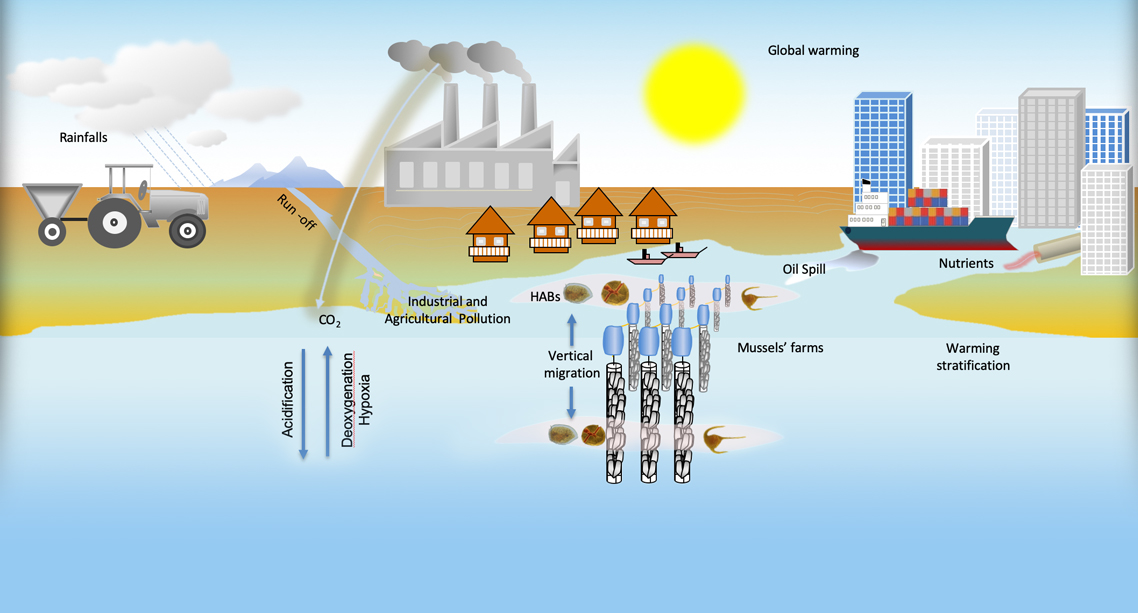The BIVALVIANET has been established by researchers with expertise on several scientific disciplines including physiology, molecular biology, conservation and management of marine resources, epidemiology, marine pollution, climatology and oceanography. In the context of climate change, the BIVALVIANET will develop multidisciplinary research in order to understand how changes in environmental conditions, including pathogens, translate into physiological responses (from molecules to whole organism) of economically important edible bivalve species distributed in several Greek coastal areas and they are harvested either from farmed or wild populations.
One of the many advantages of a multidisciplinary approach is that it opens communication between complementary scientific fields and fills knowledge gaps, thus facilitating progression, both within individual fields and the broader field of climate change research. The latter will contribute to the identification of “hot spots”: marine areas along the Greek coastlines at risk due to climate change. The main objectives of BIVALVIANET are:
- To assess the current status and risk of the coastal areas through analysis of existing and newly-collected data, as well as model simulations.
- To design and perform laboratory and field research meant to unravel molecular and biochemical mechanisms associated with physiological constrains in bivalve species living under the current and predicted future synergistic effects of stressful environmental conditions.
- To analyze oceanographic and climatological data over the last 50 years at a regional scale, and to simulate future projections of climate change in marine areas with intensive activities associated with bivalve farming and harvesting.
- To correlate physiological and immunological responses with oceanographic and climatological parameters, in order to predict possible future impacts of climate change on mussel farming on a regional scale.
- To build links between stakeholders in order to evaluate the socio-economic impacts of climate change on bivalve farming.
- To develop and apply metagenomic analysis identifying marine areas with high risk of pathogen infestation and risk to public health.
- To help improve communication between policymakers and scientists so that the new policies are based on current findings and the scientific studies are widened to include the most policy-relevant questions.
The above objectives are grouped into three main goals, which concern: (a) research (b) risk assessment and (c) risk management.

Research Group
- Basile Michaelidis Professor – Laboratory of Animal Physiology, Department of Zoology, School of Biology, Aristotle University of Thessaloniki, GR-54124, Greece
- Ioannis Theodorou Assistant Professor – Department of Animal Production Fisheries & Aquaculture, University of Patras, Mesolonghi, Greece
- Ioannis A. Giantsis Assistant Professor – Faculty of Agricultural Sciences, University of Western Macedonia, Hellas
- Costas Batargias Associate Professor- Applied Genetics and Fish Breeding University of Patras Animal Production, Fisheries and Aquaculture Dept, 30200 Messolonghi, Greece
- Alexis Ramfos Associate Professor -Department of Animal Production, Fisheries & Aquaculture, University of Patras, Greece
- Dionisios Raitsos Assistant Professor- Department of Zoology-Marine Biology, Faculty of Biology, National and Kapodistrian University of Athens, Panepistimiopolis, Athens, 15784, Greece
- Konstantinos Feidantsis, Postoctoral Researcher – Laboratory of Animal Physiology, Department of Zoology, School of Biology, Aristotle University of Thessaloniki, GR-54124, Greece Kostas
- Dr Efthimios Spinos Biologist-Ichthyologist MSc, PhD- Fisheries Department of Directorate of Agricultural Economy, Region of Western Greece, Aretha & Papadiamanti 14, 26443, Patras, Greece
- Athanasios Lattos PhD stude- Laboratory of Animal Physiology, Department of Zoology, School of Biology, Aristotle University of Thessaloniki, GR-54124, Greece
- Ioannis Georgoulis PhD student- Laboratory of Animal Physiology, Department of Zoology, School of Biology, Aristotle University of Thessaloniki, GR-54124, Greece
- Antonia Gougousi PhD student- Laboratory of Animal Physiology, Department of Zoology, School of Biology, Aristotle University of Thessaloniki, GR-54124, Greece
- Iason Theodorou PhD student- Department of Zoology-Marine Biology, Faculty of Biology, National and Kapodistrian University of Athens, Panepistimiopolis, Athens, 15784, Greece
- Dimitris Papadopoulos PhD student- Laboratory of Animal Physiology, Department of Zoology, School of Biology, Aristotle University of Thessaloniki, GR-54124, Greece
- Vasiliki Makri Laboratory of Animal Physiology, Department of Zoology, School of Biology, Aristotle University of Thessaloniki, GR-54124, Greece
Collaborating Members
- Ioannis KatsogiannisAssociate Professor for Environmental Technolog- Aristotle University of Thessaloniki, Department of Chemistry, Division of Chemical Technology, 54124, Greece, www.katsoyiannis.gr
- Maria KalaitzidouPhD- National Reference Laboratory for Marine Biotoxins Directorate of Veterinary Center of Thessaloniki General Veterinary Directorate Ministry of Rural Development and Food, Greece
- Dr. Dimitris karagiannis-Ministry of Rural Development and Food Directorate of Veterinary Centre of Thessaloniki Department of Avian, Honey Bee and Aquatic Organisms Diseases National Reference Laboratory for Mollusc Diseases 7 Frixou street, 546 27 Thessaloniki, Greece
- Dr. Dionysia Mintzadmintza- Ministry of Rural Development and Food of Greece, Directorate-General of Veterinary Services, Directorate of Veterinary Public Health, Department of Fishery products, Milk and other Food of animal origin, 46 Veranzerou str., 10438, Athens
- Nikolaos PapadakisProfessor- Laboratory of Hygiene, Social – Preventive Medicine and Medical Statistics, Division of Biological Sciences and Preventive Medicine, Faculty of Medicine, Aristotle University of Thessaloniki, Greece
- Andreas AnestisResearcher, Adjunct Professor- Laboratory of Hygiene, Social – Preventive Medicine and Medical Statistics, Division of Biological Sciences and Preventive Medicine, Faculty of Medicine, Aristotle University of Thessaloniki, Greece
Programs
-
Innovative actions for the monitoring – recovering – enhancement of the natural recruitment of the endangered species (fun mussel) Pinna nobilis.
-
Development of the best control practices of invasive ascidians in mussel farming infrastructures and remediation of economic effects of invasion.


